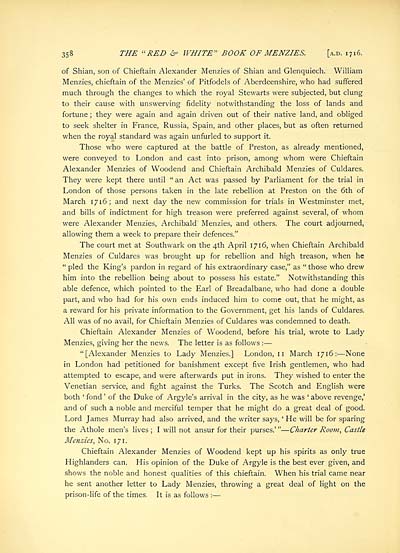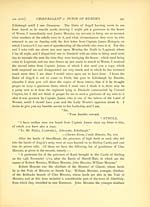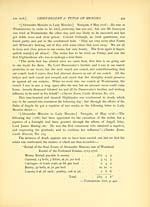Red and white book of Menzies
(454) Page 358
Download files
Complete book:
Individual page:
Thumbnail gallery: Grid view | List view

358 THE U RED & WHITE" BOOK OF MENZIES. [a.d. 1716.
of Shian, son of Chieftain Alexander Menzies of Shian and Glenquiech. William
Menzies, chieftain of the Menzies' of Pitfodels of Aberdeenshire, who had suffered
much through the changes to which the royal Stewarts were subjected, but clung
to their cause with unswerving fidelity notwithstanding the loss of lands and
fortune ; they were again and again driven out of their native land, and obliged
to seek shelter in France, Russia, Spain, and other places, but as often returned
when the royal standard was again unfurled to support it.
Those who were captured at the battle of Preston, as already mentioned,
were conveyed to London and cast into prison, among whom were Chieftain
Alexander Menzies of Woodend and Chieftain Archibald Menzies of Culdares.
They were kept there until " an Act was passed by Parliament for the trial in
London of those persons taken in the late rebellion at Preston on the 6th of
March 1716; and next day the new commission for trials in Westminster met,
and bills of indictment for high treason were preferred against several, of whom
were Alexander Menzies, Archibald Menzies, and others. The court adjourned,
allowing them a week to prepare their defences."
The court met at Southwark on the 4th April 1716, when Chieftain Archibald
Menzies of Culdares was brought up for rebellion and high treason, when he
" pled the King's pardon in regard of his extraordinary case," as " those who drew
him into the rebellion being about to possess his estate." Notwithstanding this
able defence, which pointed to the Earl of Breadalbane, who had done a double
part, and who had for his own ends induced him to come out, that he might, as
a reward for his private information to the Government, get his lands of Culdares.
All was of no avail, for Chieftain Menzies of Culdares was condemned to death.
Chieftain Alexander Menzies of Woodend, before his trial, wrote to Lady
Menzies, giving her the news. The letter is as follows : —
"[Alexander Menzies to Lady Menzies.] London, 11 March 1716: — None
in London had petitioned for banishment except five Irish gentlemen, who had
attempted to escape, and were afterwards put in irons. They wished to enter the
Venetian service, and fight against the Turks. The Scotch and English were
both ' fond ' of the Duke of Argyle's arrival in the city, as he was ' above revenge,'
and of such a noble and merciful temper that he might do a great deal of good.
Lord James Murray had also arrived, and the writer says, ' He will be for sparing
the Athole men's lives ; I will not ansur for their purses.' " — Charter Room, Castle
Menzies ; No. 171.
Chieftain Alexander Menzies of Woodend kept up his spirits as only true
Highlanders can. His opinion of the Duke of Argyle is the best ever given, and
shows the noble and honest qualities of this chieftain. When his trial came near
he sent another letter to Lady Menzies, throwing a great deal of light on the
prison-life of the times. It is as follows : —
of Shian, son of Chieftain Alexander Menzies of Shian and Glenquiech. William
Menzies, chieftain of the Menzies' of Pitfodels of Aberdeenshire, who had suffered
much through the changes to which the royal Stewarts were subjected, but clung
to their cause with unswerving fidelity notwithstanding the loss of lands and
fortune ; they were again and again driven out of their native land, and obliged
to seek shelter in France, Russia, Spain, and other places, but as often returned
when the royal standard was again unfurled to support it.
Those who were captured at the battle of Preston, as already mentioned,
were conveyed to London and cast into prison, among whom were Chieftain
Alexander Menzies of Woodend and Chieftain Archibald Menzies of Culdares.
They were kept there until " an Act was passed by Parliament for the trial in
London of those persons taken in the late rebellion at Preston on the 6th of
March 1716; and next day the new commission for trials in Westminster met,
and bills of indictment for high treason were preferred against several, of whom
were Alexander Menzies, Archibald Menzies, and others. The court adjourned,
allowing them a week to prepare their defences."
The court met at Southwark on the 4th April 1716, when Chieftain Archibald
Menzies of Culdares was brought up for rebellion and high treason, when he
" pled the King's pardon in regard of his extraordinary case," as " those who drew
him into the rebellion being about to possess his estate." Notwithstanding this
able defence, which pointed to the Earl of Breadalbane, who had done a double
part, and who had for his own ends induced him to come out, that he might, as
a reward for his private information to the Government, get his lands of Culdares.
All was of no avail, for Chieftain Menzies of Culdares was condemned to death.
Chieftain Alexander Menzies of Woodend, before his trial, wrote to Lady
Menzies, giving her the news. The letter is as follows : —
"[Alexander Menzies to Lady Menzies.] London, 11 March 1716: — None
in London had petitioned for banishment except five Irish gentlemen, who had
attempted to escape, and were afterwards put in irons. They wished to enter the
Venetian service, and fight against the Turks. The Scotch and English were
both ' fond ' of the Duke of Argyle's arrival in the city, as he was ' above revenge,'
and of such a noble and merciful temper that he might do a great deal of good.
Lord James Murray had also arrived, and the writer says, ' He will be for sparing
the Athole men's lives ; I will not ansur for their purses.' " — Charter Room, Castle
Menzies ; No. 171.
Chieftain Alexander Menzies of Woodend kept up his spirits as only true
Highlanders can. His opinion of the Duke of Argyle is the best ever given, and
shows the noble and honest qualities of this chieftain. When his trial came near
he sent another letter to Lady Menzies, throwing a great deal of light on the
prison-life of the times. It is as follows : —
Set display mode to:
![]() Universal Viewer |
Universal Viewer | ![]() Mirador |
Large image | Transcription
Mirador |
Large image | Transcription
Images and transcriptions on this page, including medium image downloads, may be used under the Creative Commons Attribution 4.0 International Licence unless otherwise stated. ![]()
| Histories of Scottish families > Red and white book of Menzies > (454) Page 358 |
|---|
| Permanent URL | https://digital.nls.uk/96658180 |
|---|
| Description | A selection of almost 400 printed items relating to the history of Scottish families, mostly dating from the 19th and early 20th centuries. Includes memoirs, genealogies and clan histories, with a few produced by emigrant families. The earliest family history goes back to AD 916. |
|---|

